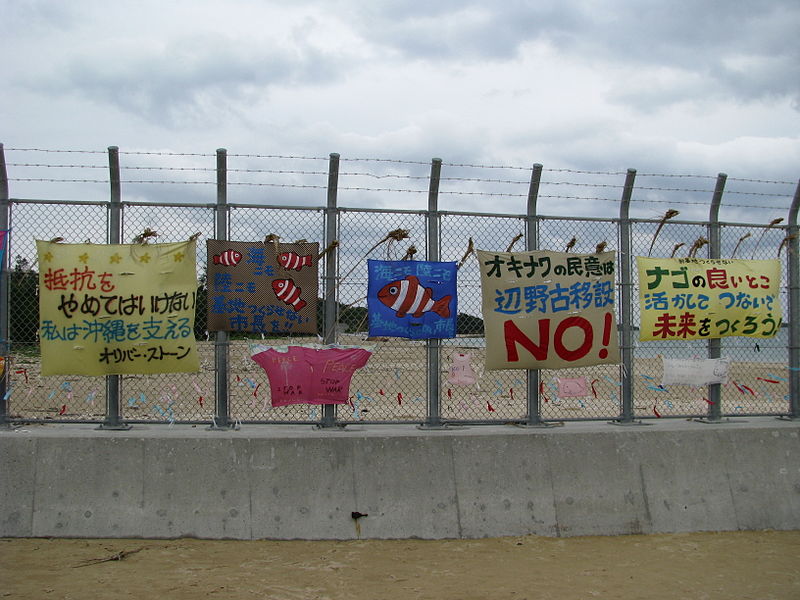On August 8th, the governor of Japan’s Okinawa prefecture passed away.[1] A polarizing figure, Governor Takeshi Onaga was well known for leading efforts to reduce U.S. military presence in Okinawa. Most notably, he opposed the relocation of U.S. Marine Corps Air Station Futenma from Ginowan to Henoko in Nago City.[2] In July 2017, Onaga even sued the central government in an attempt to stop the relocation and, prior to his death, revoked the construction permit needed for landfill work at the relocation site.[3][4] While his death undoubtedly caused much sorrow for Okinawans, it has also opened the door for major change in the prefectural politics of Okinawa. The status of the pending relocation of this American military establishment depends entirely on the results of Okinawa’s gubernatorial election taking place on September 30th.
The vacant governor seat will be contested by Atsushi Sakima—a former mayor of Ginowan backed by Prime Minister Abe’s Liberal Democratic Party—and Denny Tamaki—a Liberal Party politician backed by the “All Okinawa,” an Onaga-established movement dedicated to the relocation of U.S. military bases outside the prefecture.[5] This election will not only decide the next governor of Okinawa, but has the potential to end the decade-long conflict between the central government and the Okinawa prefectural government. The political effects of this election will likely be far-reaching, transcending national borders and significantly influencing U.S. foreign policy in the Asia-Pacific region.
Historically, the governor’s role in this issue has been substantial. With the authority to approve or reject offshore landfill construction, the governor is in a strong position to veto any relocation efforts that rely on landfill construction, such as in the case of the U.S. Marine Corps base.[6] Onaga’s predecessor wavered on this issue according to the political climate, but from the moment he stepped into office, Onaga was adamant that the bases be moved outside of Okinawa. For years, this firm stance was at odds with the central government, which led to political deadlock during his four-year tenure.
The passion fueling this conflict dates back to the ending of World War II, when the U.S. held possession of Okinawa’s Ryukyu Islands.[7] The U.S. paid locals for the acquired land, but often resorted to using coercive and manipulative tactics to evict unwilling residents.[8] Since then, many Okinawans have felt that the U.S. and central government have been working with little concern for the people living in the prefecture. Such sentiments recently led 70,000 Okinawans to protest in the prefectural capital of Naha, demanding the immediate scrapping of the relocation plans.[9] In the face of such massive anti-government demonstrations, Tokyo is unable to ignore the central issue: Okinawa hosts almost 25% of all American military facilities in Japan, but citizens don’t feel they have received adequate explanation as to why this is, or how the Japanese-American alliance benefits them.[10][11]
Though Onaga’s initiatives to halt the base’s relocation and rid the prefecture of American military establishments largely ended in failure, partly due to his untimely death, citizens’ current feelings vary. In general, citizens have adopted three main perspectives. First is the view that the presence of American bases has economic benefits, such as employment and business opportunities.[12] Another view is that bases should be more equally distributed among the prefectures.[13] Lastly, there is the complete opposition to American military presence in Japan, which tends to stem from one of two priorities: quality of life or anti-militarism.[14] The former argues that the noise, crime, accidents, and environmental issues associated with American military bases is unacceptable. There have been reports of more than 500 “heinous” crimes committed by U.S. troops since 1972, and recent accidents, such as the crash-landing of a Futenma-based Osprey in 2016, have led to further cries for ending American military presence.[15][16] The latter rejects violence in general, and their sentiments likely derive from personal experiences with war. They want no part of any military activities in the region, including the U.S.-Japan security alliance.[17]
While citizens hold a variety of views on this issue, a widely shared sentiment is that the central government isn’t working proactively to solve it. A recent poll suggested that 43.8% of Okinawans are against the relocation of the base.[18] Asked what they see as most important in the upcoming election, 47% cited the base relocation.[19] While impressive on its own, this poll does not manage to illuminate the full extent of opposition to the relocation across all demographic categories, as over 90% of the respondents were over the age of 50. Considering younger generations will be most affected by this decision, it is of utmost importance that their opinions are also considered.
For the central government of Japan, the main concern of this election is the festering of further intensified resentment toward the relocation of the base. If Tamaki is elected, he will undoubtedly follow Onaga in demanding that the base be relocated out of the prefecture. This would seriously hinder the legacy of the Abe administration, as the current cabinet would go down in history as one that could not relieve regional resentment. If Sakima is elected, Prime Minister Abe could take the results as a referendum of sorts to legitimize his approval of the relocation. Although Sakima is yet to officially declare his position on this issue, it is safe to assume that the Liberal Democratic Party (LDP) has ensured that he will not get in the way of the relocation if elected. The challenge now lies in preserving the U.S.-Japan alliance while maintaining the integrity of the relationship between the central Japanese government and the people of Okinawa. In this conflict, inevitably one side will benefit, while the other suffers the consequences. If the cabinet does accept Okinawa’s demands, Japan could lose the military support of the U.S., which would be detrimental to the security of the nation. The government thus faces a major junction. They must either gather support from Okinawa, or choose to abandon Okinawans and comply with the U.S.
Since the end of World War II, American military presence in Okinawa has been of strategic importance for the U.S. to maintain security in the Asia-Pacific region. Now more than ever, it serves as a way to keep regional competitors such as North Korea, China, and Russia in check. The U.S. has long said it would like to have a strong presence in the region to expediently react to any changing circumstances. But what would be the consequences of the U.S. withdrawing from Okinawa, or at least reducing the number of troops in the prefecture? It seems that even in the most unlikely scenario of a country waging war on Japan, the absence of American bases in Okinawa would not make a massive difference. Still, some suggest that retreating from Okinawa would signify U.S. retreat from their obligation to maintain peace in the region, since Okinawa has historically been used to attack North Korea and Vietnam in times of turmoil.[20] Considering that Okinawa has seen historical success in military operations, one can understand the view that leaving permanently could signify a retreat. However, there are plenty of American bases in other regions of Japan, such as the Kadena Air Base, that would remain strategic assets for the U.S. in the event of military conflict.[21] In that sense, countries are unlikely to see this as a U.S. retreat from their obligations in maintaining peace over the region.[22]
For the U.S., the results of this election may force changes in foreign policy in Asia. The reelection of an anti-base governor would serve as a wake-up call for the U.S. that Okinawans do not want its presence in their prefecture. It seems it is time for a reevaluation of the real threats to American national security in the region. The most immediate and dangerous threat is North Korea and its nuclear weapons. When the threat is nuclear, the number of stationed troops is of far lesser priority. What matters is whether the country has THAAD (Terminal High Altitude Area Defense) or other forms of anti-ballistic missile systems and the personnel to operate them. As for the threat from China, the other main regional adversary, the most pressing issue is China’s growing economic dominance over other Asian countries. Addressing this economic crisis should be the chief concern for the U.S. Any potential military conflict can be effectively dealt with from other American bases in Japan or nearby countries. Under modern circumstances, it does not seem necessary to station tens of thousands of military personnel in Okinawa. Nonetheless, this election will serve as a major turning point in U.S. foreign policy, solidifying its priorities in the Asia-Pacific region.
Considering the ballooning costs and growing resentment from local residents, it seems like an appropriate time to reconsider priorities. Perceived threats can be addressed more efficiently. Perhaps a joint security alliance between Japan and neighboring countries, such as South Korea, could be established with the support of the U.S. Instead of arming allies with American troops, the U.S. could return the initiative to its Asian allies, which would save a significant amount of money.[23] The U.S.-Japan security alliance was established as a result of Japan losing its army after World War II. Now that Japan’s Self Defense Force (SDF) is capable of defending the nation, it may be time for the U.S. to move behind the scenes in Asia, and let countries like Japan take the driver’s seat. American presence in allied Asian countries will realistically continue into the foreseeable future, but in light of public outrage and resentment, such as the situation in Okinawa, perhaps the U.S. should begin working toward fostering a more sustainable, self-sufficient Asia-Pacific region.
In short, the costs simply don’t outweigh the benefits. The people of Okinawa will remain hostile and financial costs for the U.S. will remain high. Without any real benefit aside from occasional training exercises, there is no reason to keep so many soldiers stationed permanently in Okinawa. This is not to say, however, that American military presence in Japan should be dissolved entirely. Kadena, Sasebo, and Iwakuni, three other bases in Japan, would provide adequate support in any worst-case scenario. There is no need for the U.S. to continue to risk its alliance with Japan by remaining in a region opposed to its military presence. In any case, endangering the U.S.-Japan alliance itself seems to be the riskiest move to make.
With such widespread resistance from local citizens, relocation of the Marine Corps base in Okinawa is clearly not a reasonable option. It has been more than 10 years since this issue first arose, and now the leader of the opposition, Onaga, has died. This is a perfect opportunity to move toward a solution. The Japanese government must finally decide whether they support Okinawa’s opposition to the relocation or conclusively side with the U.S. on this matter. Furthermore, the Abe administration must face reality and negotiate with the U.S. The legacy Prime Minister Abe’s cabinet should be striving to establish is one of strength and reassurance during a time of conflict within the nation. As for the U.S., setting foreign policy priorities straight is crucial. There needs to be a realization that modern war is not just of military force, but often takes the form of other means, such as economic or political manipulation. Both the U.S. and Japan must act before it is too late, contemplating possible solutions and consequences carefully and seeking a long overdue resolution to this conflict.
[1] Rich, Motoko. “Takeshi Onaga, Critic of U.S. Bases as Okinawa Governor, Dies at 67.” The New York Times. August 09, 2018. https://www.nytimes.com/2018/08/09/obituaries/takeshi-onaga-okinawa-governor-and-critic-of-us-bases-dies-at-67.html.
[2] Pollmann, Mina. “What to Watch in the Okinawa Governor’s Election.” The Diplomat. August 22, 2018. https://thediplomat.com/2018/08/what-to-watch-in-the-okinawa-governors-election.
[3] Burke, Matthew M. “Okinawa Sues Japanese Government in Fresh Attempt to Stop Base Relocation.” Stars and Stripes. July 26, 2017. https://www.stripes.com/okinawa-sues-japanese-government-in-fresh-attempt-to-stop-base-relocation-1.479870.
[4] “Okinawa Retracts Approval of Landfill Work for US Base Transfer.” South China Morning Post. August 31, 2018. https://www.scmp.com/news/asia/east-asia/article/2162302/okinawa-retracts-approval-landfill-work-us-base-transfer.
[5] Pollmann, Mina. “What to Watch in the Okinawa Governor’s Election.”
[6] Chanlett-Avery, Emma; Rinehart, Ian E. “The U.S. Military Presence in Okinawa and the Futenma Base Controversy.” Congressional Research Service. August 3, 2012: Page 9. https://www-heinonline-org.ezproxy.neu.edu/HOL/Page?collection=congrec&handle=hein.crs/crsmthaadsc0001&id=7&men_tab=srchresults.
[7] Ibid, Page 4.
[8] Ibid.
[9] Yamaguchi, Mari. “Tens of Thousands Rally for Removal of US Base off Okinawa.” AP News. August 12, 2018. https://www.apnews.com/098bb9550e0f4fdb9aa5dd7b177e740b.
[10] Chanlett-Avery et al. “The U.S. Military Presence in Okinawa and the Futenma Base Controversy,” Page 8.
[11] Ibid.
[12] Ibid, Page 10.
[13] Ibid, Page 4.
[14] Ibid.
[15] Narang, Sonia. “Despite Longstanding Local Opposition, the US Is Expanding Its Okinawa Military Base.” Public Radio International. August 8, 2017. https://www.pri.org/stories/2017-08-08/despite-longstanding-local-opposition-us-expanding-its-okinawa-military-base.
[16] Robson, Seth. “Japanese Defense Minister Expresses Concern After Osprey Crash Report.” Military.com. May 24, 2018. https://www.military.com/daily-news/2018/05/24/japanese-defense-minister-expresses-concern-after-osprey-crash-report.html.
[17] Chanlett-Avery et al. “The U.S. Military Presence in Okinawa and the Futenma Base Controversy.” Page 4.
[18] “Survey Regarding the Okinawa Gubernatorial Election.” Research Com. August 25, 2018. https://researchcom.jp/casestudy/electionsurvey/detail_LP.php?Target=okinawa201808.
[19] Ibid.
[20] Essertier, Joseph. “Fact Sheet: US Military Bases in Okinawa.” World Beyond War. January 02, 2018. https://worldbeyondwar.org/fact-sheet-us-military-bases-okinawa.
[21] Buss, Jarek. “Why America Should Pull Out of Okinawa.” The National Interest. August 18, 2018. https://nationalinterest.org/blog/skeptics/why-america-should-pull-out-okinawa-29112?page=0.
[22] Buss, Jarek. “Why America Should Pull Out of Okinawa.”
[23] Vine, David. “Don’t Just Close Bases at Home, Close Them Overseas.” The New York Times. July 27, 2015. https://www.nytimes.com/2015/07/27/opinion/dont-just-close-bases-at-home-close-them-overseas.html.



